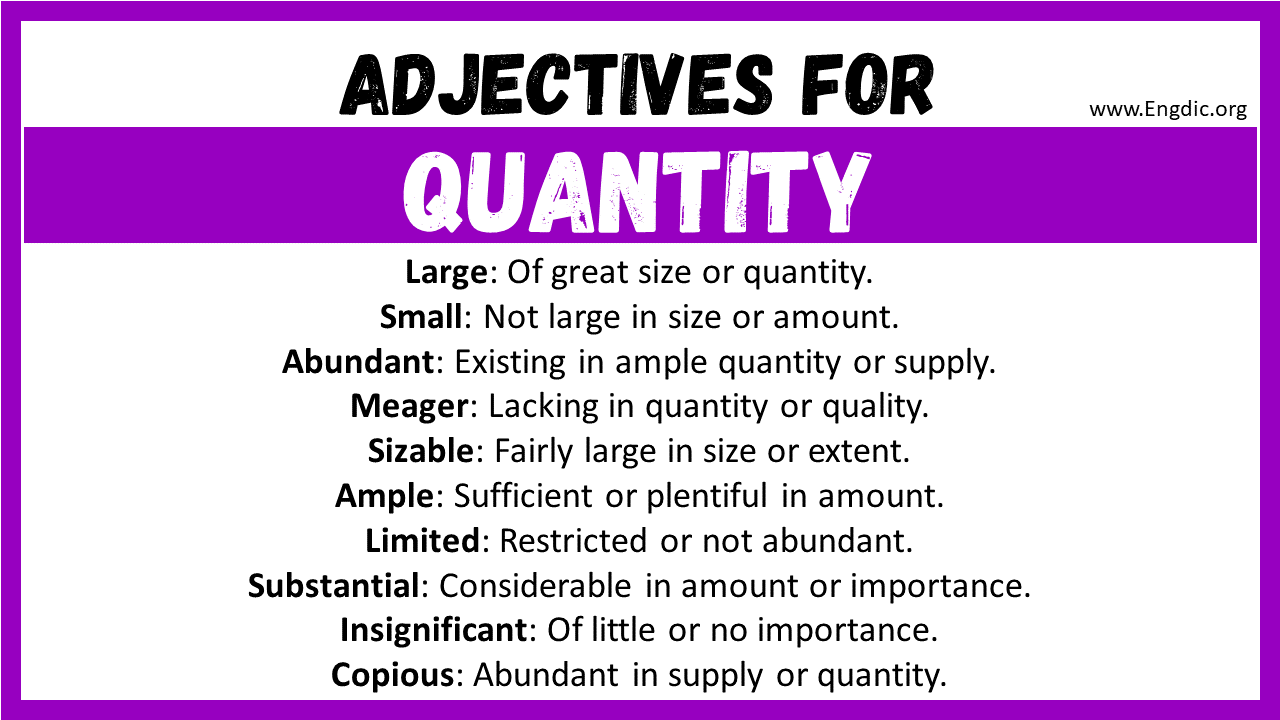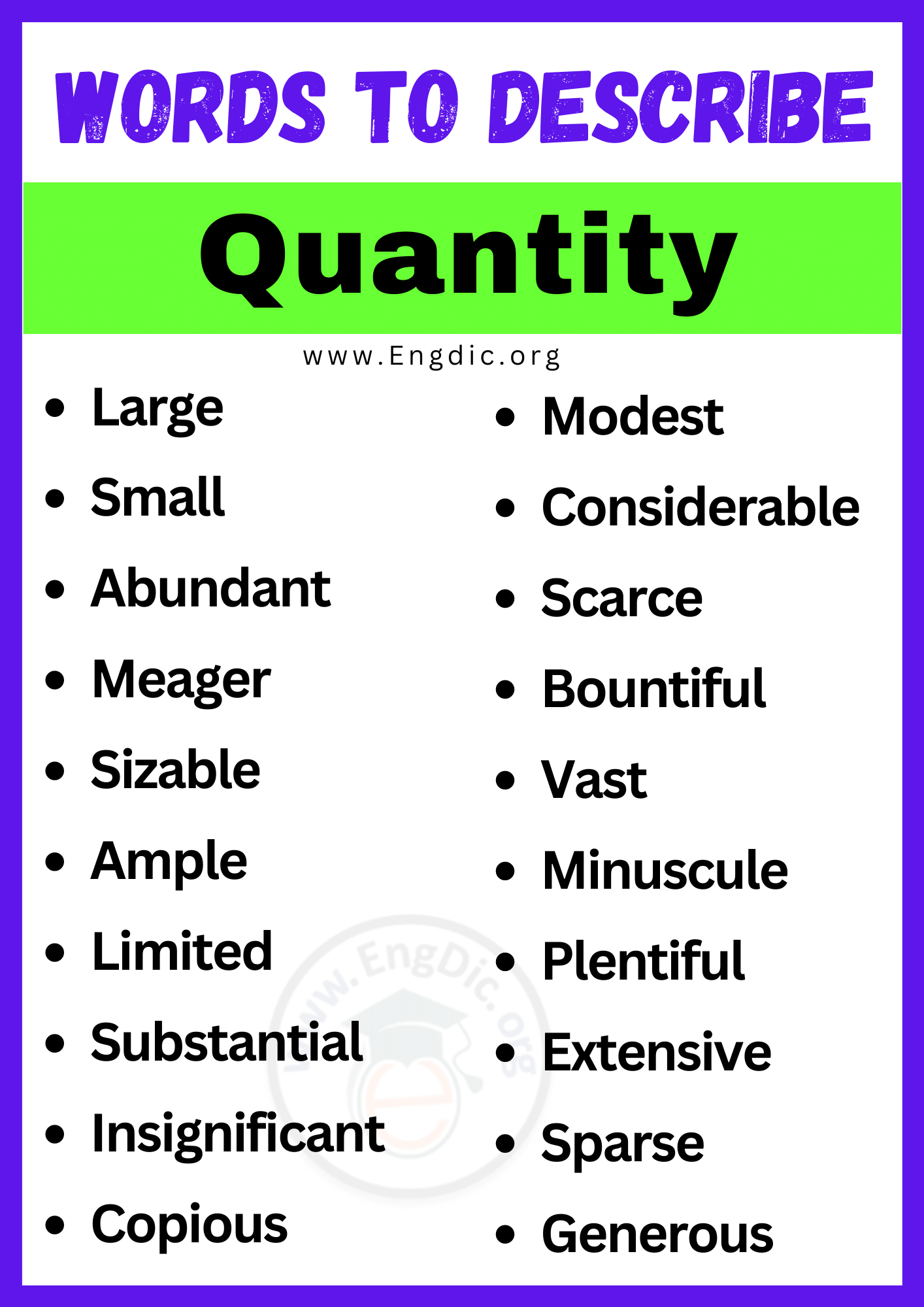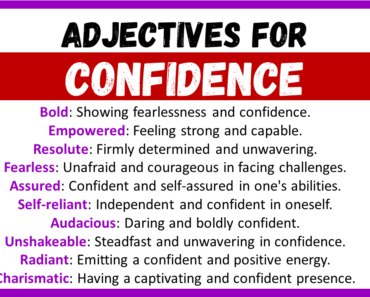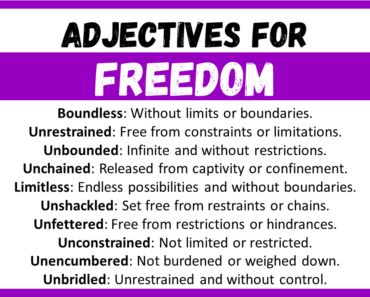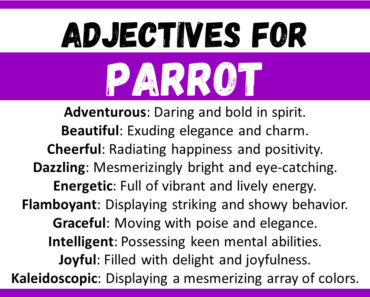When it comes to expressing the amount or size of something, we rely on words to describe quantity. Quantity refers to the numerical value or extent of an object, substance, or concept. These words help us communicate the magnitude or scale of things in a clear and concise manner. From “few” and “many” to “abundant” and “scant,” the English language offers a diverse range of terms to precisely convey the number of items or ideas. In this blog post, we will explore some common words used to describe quantity and delve into their meanings and usage.
Adjectives for Quantity
Here are the 20 Most Popular adjectives for quantity:
- Large
- Small
- Abundant
- Meager
- Sizable
- Ample
- Limited
- Substantial
- Insignificant
- Copious
- Modest
- Considerable
- Scarce
- Bountiful
- Vast
- Minuscule
- Plentiful
- Extensive
- Sparse
- Generous
Words to Describe a Quantity with Meanings
- Large: Of great size or quantity.
- Small: Not large in size or amount.
- Abundant: Existing in ample quantity or supply.
- Meager: Lacking in quantity or quality.
- Sizable: Fairly large in size or extent.
- Ample: Sufficient or plentiful in amount.
- Limited: Restricted or not abundant.
- Substantial: Considerable in amount or importance.
- Insignificant: Of little or no importance.
- Copious: Abundant in supply or quantity.
- Modest: Relatively small or moderate in amount.
- Considerable: Great in amount, size, or importance.
- Scarce: Insufficient or hard to come by.
- Bountiful: Plentiful or generous in quantity.
- Vast: Very great in size or amount.
- Minuscule: Extremely small or tiny.
- Plentiful: Existing in large quantities or numbers.
- Extensive: Covering a large area or amount.
- Sparse: Thinly scattered or less abundant.
- Generous: More than enough or ample.
Example Sentences for Quantity Adjectives
- The elephant had a large trunk.
- She carried a small bag with her.
- The garden was filled with abundant flowers.
- They had to survive on a meager meal.
- He received a sizable paycheck for his work.
- The refrigerator was stocked with ample food.
- The tickets were limited in number.
- They made a substantial investment in the project.
- His contribution was insignificant compared to others.
- The rain brought copious amounts of water.
- She made a modest donation to the charity.
- The project required considerable time and effort.
- Water became scarce during the drought.
- They enjoyed a bountiful harvest from their farm.
- The desert stretched out as a vast expanse.
- He found a minuscule insect crawling on his arm.
- The supermarket had plentiful supplies of fresh produce.
- The research covered an extensive range of topics.
- The forest was sparse with trees.
- She was known for her generous donations to charity.
Explore More Words:
Adjectives for Large Quantity:
- Massive
- Enormous
- Huge
- Tremendous
- Gigantic
- Immense
- Colossal
- Mammoth
- Monumental
- Prodigious
Adjectives for Abundant Quantity:
- Plentiful
- Overflowing
- Bounteous
- Excessive
- Voluminous
- Extensive
- Copious
- Innumerable
- Prolific
- Lavish
Adjectives for Generous Quantity:
- Ample
- Substantial
- Considerable
- Sizeable
- Sizable
- Decent
- Liberal
- Handsome
- Gracious
- Abounding
FAQ’s
How to describe quantity in writing?
Quantity can be effectively described in writing by using precise numerical figures or descriptive terms such as “a large number,” “a significant amount,” or “a few.”
Is much an adjective of quantity?
Yes, “much” is an adjective of quantity commonly used to express a large or considerable amount of something.
What are the adjectives of quantity questions?
Adjectives of quantity questions include words such as “how much,” “how many,” “several,” “few,” “some,” “numerous,” “plenty,” and “a lot.” These adjectives help specify the amount or quantity of something being referred to.
